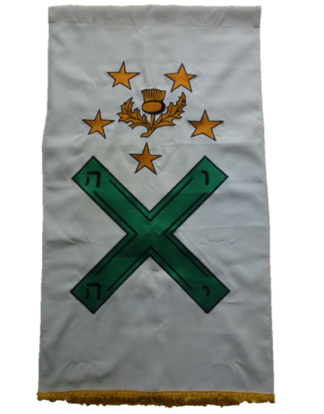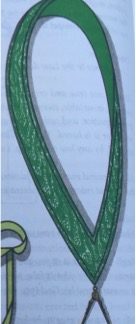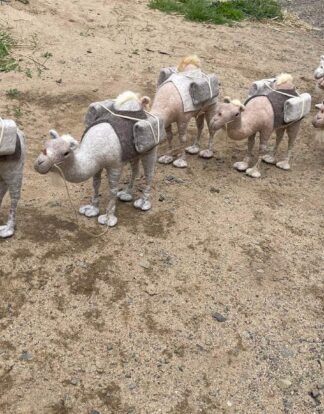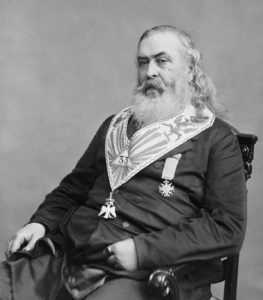 Albert Pike was the Master Builder of the Scottish Rite and was chiefly responsible for its current development and ceremonial. His ritual revisions and philosophy have influenced those of most Supreme Councils worldwide, and his writings are among the most insightful and profound in the history of Freemasonry. The great English Masonic historian, Robert F. Gould, wrote that Pike “was himself probably the most gifted of all the scholars and antiquaries whose writings have from time to time cast a luster on the literature of Freemasonry” (Ars Quatuor Coronatorum 16 [1903], p.28)
Albert Pike was the Master Builder of the Scottish Rite and was chiefly responsible for its current development and ceremonial. His ritual revisions and philosophy have influenced those of most Supreme Councils worldwide, and his writings are among the most insightful and profound in the history of Freemasonry. The great English Masonic historian, Robert F. Gould, wrote that Pike “was himself probably the most gifted of all the scholars and antiquaries whose writings have from time to time cast a luster on the literature of Freemasonry” (Ars Quatuor Coronatorum 16 [1903], p.28)
Born in 1809, Pike became a Mason in 1850, became active in the York Rite, and received the 32 degrees in 1853 and immediately became interested in all aspects of the Scottish Rite. Between 1854 and 1855 he transcribed and began studying its degrees and, in the latter year, was appointed to a committee to revise the rituals. He was the only member of the committee to produce any results, and his self-published revision, though never officially adopted, would serve as the foundation for the majority of Scottish Rite rituals world-wide. His revisions made the Rite a connected system of moral, religious and philosophical instruction. His world experience was vast. He was, among other things, an explorer, lawyer, Indian agent, Civil War Brigadier General (CSA), author, editor, historian, poet, translator, publisher, philosopher, scholar of Vedic literature, and polyglot.
He received the 33 degree in 1857, became an Active Member in 1858, and was elected Grand Commander of the Supreme Council in 1859 – a position which he held until his death in 1891. He requested that if a monument was placed on his grave, it should bear the simple inscription, “Laborum ejus Superstites aunt fructus vixit” (He has lived. The fruits of his labors of live after him). At the closing of each Session of the Supreme Council the following memorial is offered in his remembrance:
And now to the memory of him who said — “When I am dead, I wish my monument to be builded only
in the hearts and memories of my Brethren of the Ancient and Accepted Rite, and my name to be
remembered by them in every country, no matter what language men speak there, when the light of the
Ancient and Accepted Scottish Rite shall shine and its Oracles of Truth and Wisdom be reverently
listened to.”
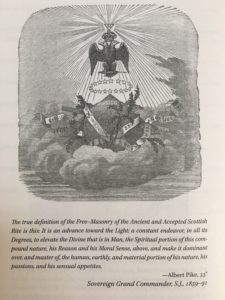
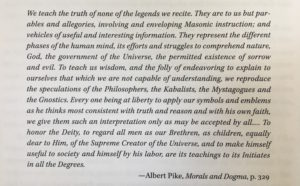

— from the “Scottish Rite Ritual” Monitor & Guide book by Arturo De Hoyos
read on Wikipedia
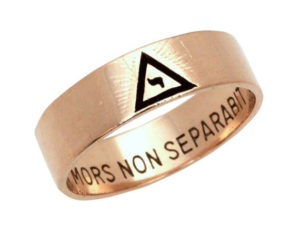
 Albert Pike was the Master Builder of the Scottish Rite and was chiefly responsible for its current development and ceremonial. His ritual revisions and philosophy have influenced those of most Supreme Councils worldwide, and his writings are among the most insightful and profound in the history of Freemasonry. The great English Masonic historian, Robert F. Gould, wrote that Pike “was himself probably the most gifted of all the scholars and antiquaries whose writings have from time to time cast a luster on the literature of Freemasonry” (Ars Quatuor Coronatorum 16 [1903], p.28)
Albert Pike was the Master Builder of the Scottish Rite and was chiefly responsible for its current development and ceremonial. His ritual revisions and philosophy have influenced those of most Supreme Councils worldwide, and his writings are among the most insightful and profound in the history of Freemasonry. The great English Masonic historian, Robert F. Gould, wrote that Pike “was himself probably the most gifted of all the scholars and antiquaries whose writings have from time to time cast a luster on the literature of Freemasonry” (Ars Quatuor Coronatorum 16 [1903], p.28)


